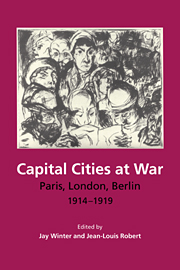Book contents
- Frontmatter
- Contents
- Note on joint authorship
- List of figures
- List of tables
- Part 1 Premises
- Part 2 The Social Relations of Sacrifice
- Part 3 The social relations of labour
- Part 4 The social relations of incomes
- Part 5 The social relations of consumption
- 11 Feeding the cities
- 12 Coal and the metropolis
- 13 Housing
- Part 6 Urban demography in wartime
- Part 7 Towards a social history of capital cities at war
- Statistical appendix and tables
- Bibliography
- Index
11 - Feeding the cities
Published online by Cambridge University Press: 15 December 2009
- Frontmatter
- Contents
- Note on joint authorship
- List of figures
- List of tables
- Part 1 Premises
- Part 2 The Social Relations of Sacrifice
- Part 3 The social relations of labour
- Part 4 The social relations of incomes
- Part 5 The social relations of consumption
- 11 Feeding the cities
- 12 Coal and the metropolis
- 13 Housing
- Part 6 Urban demography in wartime
- Part 7 Towards a social history of capital cities at war
- Statistical appendix and tables
- Bibliography
- Index
Summary
Introduction
Recent research on how the Great War affected food supplies and patterns of consumption in the combatant nations has concentrated on policies and conditions in aggregate or in scattered urban environments. Provisioning the three capital cities during the 1914-18 conflict was similar in kind to the problems faced in other areas. But in the case of Paris, London, and Berlin, the scale of the problem was immense. The varied success in adequately provisioning the people played a role in the ultimate outcome of the war itself. Issues not only of food supplies necessary to absolute physical survival, but also of indigenous food culture, equitable distribution, and the states' legitimacy as measured by their responses to hardships were central to both popular and policy discussions of the ‘food question’.
Paris, London, and Berlin, with their millions of inhabitants, demanded vast amounts of food: 3.6 million people to be fed in greater Berlin in 1914, over 4 million in the Paris region, and more than 7.2 million in the colossal conurbation of London. With 6 per cent of the national population in Berlin, 10 per cent in Paris and a staggering 16 per cent in London, these urban concentrations – each unique in its own country – demanded complex supply and distribution systems simply to stay afloat. In Paris, supply was a spectacular and noisy affair in the heart of the city: the ‘Stomach of Paris’, with its supporting apparatus congesting the city centre
- Type
- Chapter
- Information
- Capital Cities at WarParis, London, Berlin 1914–1919, pp. 305 - 341Publisher: Cambridge University PressPrint publication year: 1997
- 6
- Cited by



